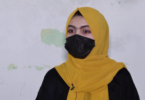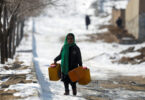KABUL (Khaama Press): The prevalence of harmful customs and gender-based violence, exacerbated by the advent of the Taliban administration, which includes bans on education and employment, threatens the lives of millions of women in Afghanistan.
A woman who suffered from domestic violence considered hanging herself with a rope as a way to escape her abusive husband.
Nilab, a 23-year-old woman, encountered domestic violence shortly after her marriage. Domestic violence, deeply rooted in regressive customs and low literacy, is the most common form of gender-based violence in Afghanistan. After leaving her father’s home post-marriage, Nilab’s life became marred by constant abuse and torture from her husband. Even during her pregnancy, she hoped for a change, but the violence was deeply entrenched.
One sunny afternoon, while pregnant, Nilab had to prepare food for her husband and his family despite her condition. Unaware that the food was saltier than usual due to her pregnancy fatigue, her husband reacted violently. The assault was so severe that it not only injured Nilab, causing multiple fractures and severe head injury, but also resulted in the loss of her five-month unborn child.
Nilab insists on anonymity, as her husband restricts her from leaving the home and seeking medical help. Before marriage, she was a promising midwife working at Malalai Hospital, but post-marriage, she faced restrictions and was not allowed to continue her job. Her life with her husband is a continuous cycle of healing from one assault, only to be bruised again under various pretexts.
The violence intensified after Nilab gave birth to a daughter, reflecting a societal preference for sons over daughters.
After two years of enduring continuous abuse and with a daughter, Nilab became pregnant again. However, as she was about to give birth, her husband, eager to know the baby’s gender, consulted doctors. The fear of bringing another daughter into the world and the subsequent violence loomed over her.
After giving birth, knowing the society and her husband’s disdain for daughters, she contemplated suicide by buying a rope from the market. She attempted to hang herself five days after her daughter’s birth but was saved by neighbours and taken to the hospital.
Nilab, saved from her suicide attempt and recovering in the hospital, suffered severe throat damage.
Even after getting a second chance at life, her husband threatened her not to speak of the incident, warning her of consequences involving her daughters and family.
Despite the societal and personal challenges she faces, Nilab remains silent, enduring the pain for the sake of her children, fearing that speaking out might worsen her situation. Her only reason for not seeking divorce is her children and the societal stigma associated with divorced women.







